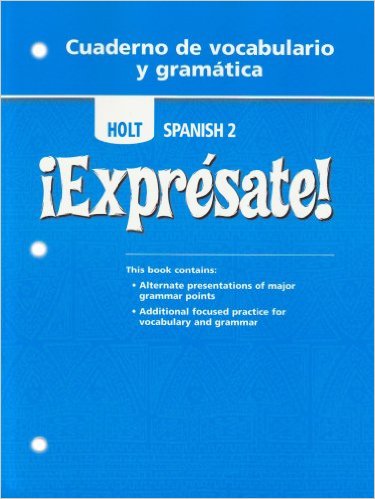
All Solutions
Page 106: Gramatica
(2) remen
(3) haya
(4) sepamos
(5) pida
(6) nademos
(7) estemos
(8) duermas
In this case, the question uses the verb *pescar* (to fish) in future tense. We can answer using another conjugated verb, such as *ir* (to go), to indicate that we will go fishing, or a verb that indicates some other activity that we want to do later. Let’s see some examples:
|Spanish |English |
|–|–|
|No, no iremos a pescar. / Sí, si iremos a pescar. | No, we will not go fishing. / Yes, we will go fishing.|
|Sí. Pescaremos y luego cocinaremos el pescado. | Yes. We will fish and then cook the fish. |
|No, iremos a nadar en el mar. | No, we will go swimming in the sea.|
The verb used in this question is *bañar* (to bathe/to swim in this case). We can use other conjugated verbs in the future tense to indicate what they will do after or instead of swimming in the sea. Let’s see some possible answers:
|Spanish |English |
|–|–|
|Sí, ellos se bañarán en el mar y luego pedirán algo de comer. |Yes, they will swim in the sea and then order something to eat. |
| No, ellos harán windsurf.|No, they will windsurf. |
In this case, the verb conjugated in the future tense is *enseñar* (to teach). We can answer by affirming the question and using some verb like *pescar* (to fish) to indicate that we will fish together.
| Spanish|English |
|–|–|
| Sí, claro. Te enseñaré y pescaremos juntos. | Yes, of course. I will teach you and we will fish together.|
In this case, the verb used is *observar* (to observe). We can use other verbs to indicate what other activities we will do or how we will prepare us for nature watch. Let’s see some examples:
| Spanish|English |
|–|–|
|Sí, iré con unos amigos y haremos una fogata. |Yes, I will go with some friends and we will make a campfire. |
|Sí, pero descansaré antes porque estoy muy cansado(a). |Yes, but I will rest before because I am very tired. |
|No, me quedaré en la tienda de campaña. |No, I’ll stay in the tent. |
As in this case the verb used is *explorar* (tp explore), we must use another verb to answer the question. For example, we can indicate what we will bring to the exploration using the verb *llevar* (to bring).
|Spanish | English|
|–|–|
|No, no iremos a explorar. | No, we will not go exploring.|
|Sí, llevaremos linternas, binóculos y un mapa. | Yes, we will bring flashlights, binoculars, and a map.|

